CommuteEd
CommuteEd is an innovative Coursera spin-off app that enables busy urban professionals and students to upskill during commutes via 5-15 minute offline micro-courses in audio, video, and quiz formats.
60+
70%
Idea Buy-In Rate
Commuters Surveyed
2 month to date (Jun–Sept 2025)
Role: Product Manager
Team of 2: myself as Product Manager and one advisor for feedback on the concept.
Prototype Development
Iterative Optimization
Pitch
Target:
Next Steps:
Validation:
Problem Statement
We spend hundreds of hours a year commuting, and most of that time we waste. In fact, the average American commuter loses 54 hours a year stuck in traffic alone. Globally, millions ride subways, buses, or trains in daily dead zones of productivity.
While platforms like Coursera offer quality long-form courses, they lack effective micro-learning options, causing frustration with video buffering, absence of audio-only modes for hands-free use, and limited offline accessibility. This leads to low engagement, with free-tier retention rates below 50%, and missed opportunities to use commute time for skill development.
Idea Validation and User Research
Analysis of Survey Feedback
Analysis of In-App Reviews
Key Pain Points:
3 key pain points I uncovered after surveying 60 commuters and analyzing 900+ Coursera app reviews by commuters -
Offline Learning Gap
Survey indicated that 1 in 6 commuters cited network issues as the main problem, while reviews indicate that 20.7% face download failures, sync issues, and storage problems, highlighting critical need where connectivity is unreliable.
Content Accessibility Crisis
Reviews showed 24.4% struggled with course access issues and content availability, while every 1 out of 4 survey respondents report not having enough time, suggesting that inaccessibility or time-intensive content exacerbates the problem.
Mobile Performance Bottleneck
25% review feedback is related to app crashes, freezing, and slow performance. while 21% of survey respondents report distractions and inability to focus as major hindrance to learning during commute time.
Solution: How CommuteED Addresses It
Seamless Offline Access
Eliminates sync and download failures by pre-caching up to 10 micro-courses with auto-sync, ensuring uninterrupted learning without relying on unstable transit Wi-Fi.
Accessible Micro-Learning
Provides AI-chunked, 5-15 minute audio-first modules with multilingual support tailored to commute times, making high-quality education flexible and inclusive.
Optimized Mobile Performance
Delivers lightweight, hands-free lectures and interactive voice quizzes, reducing crashes and app strain while keeping learners engaged durinng commutes.
My Role
Led end-to-end product management for CommuteED, driving market research, user persona creation, feature ideation, and prioritization using weighted scoring matrices.
Facilitated brainstorming sessions generating 20+ feature ideas, validated through surveys with 50+ users, ensuring user-centric product decisions.
Developed a detailed 6-month phased high-level roadmap with milestones, prioritizing high-impact, feasible features such as audio conversion for enhanced user engagement.
Created product designs using Figma, built interactive prototypes, iterated based on feedback and leveraged user data to drive metrics-driven decision-making and continuous improvement.
Market Potential
The microlearning platforms market is projected to reach $2.96 billion in 2025 globally and expected to grow to $10.3 billion by 2033, with strong demand for mobile-friendly, commute-optimized learning apps fueling this growth. This surge is driven by adoption among commuters, mobile-first users, and companies seeking flexible upskilling solutions for busy professionals.
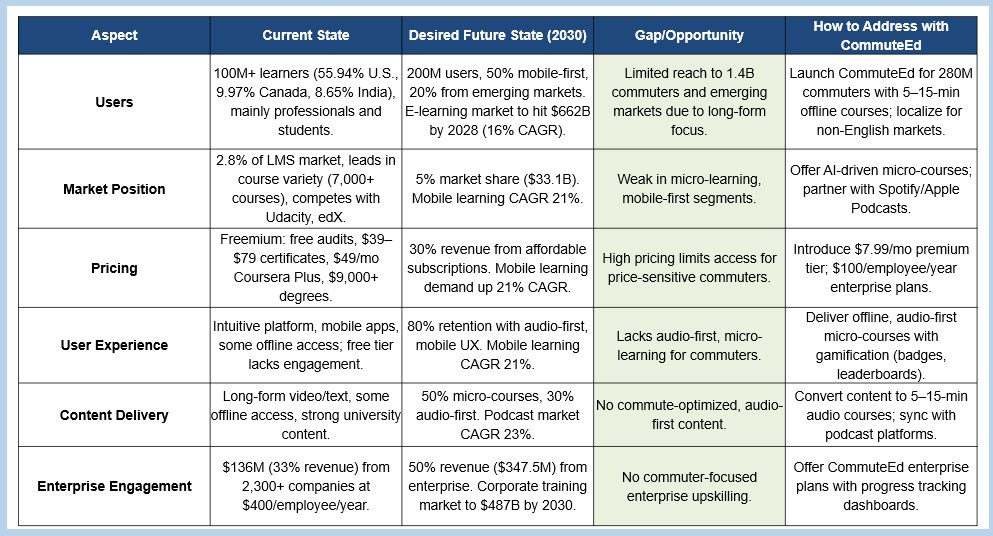

I conducted Market GAP Analysis using Coursera App as reference for CommuteED -
Total Addressable Market (TAM)
Global Commuters: Approx. 1.4 billion people commute daily (urban and suburban workers, students).
Target Segment: 20% of commuters (280 million) are motivated learners interested in upskilling or personal development.
Serviceable Available Market (SAM)
Average Annual Spend: $7.99/month premium tier = $95.88/year.
TAM Calculation: 280 million × $95.88 = $26.85 billion.
Target Segment: Focus on urban professionals and students in North America, Europe, and Asia (50% of TAM = 140 million).
Annual Value per Customer: $95.88 (premium tier).
SAM Calculation: 140 million × $95.88 = $13.42 billion.
User Personas
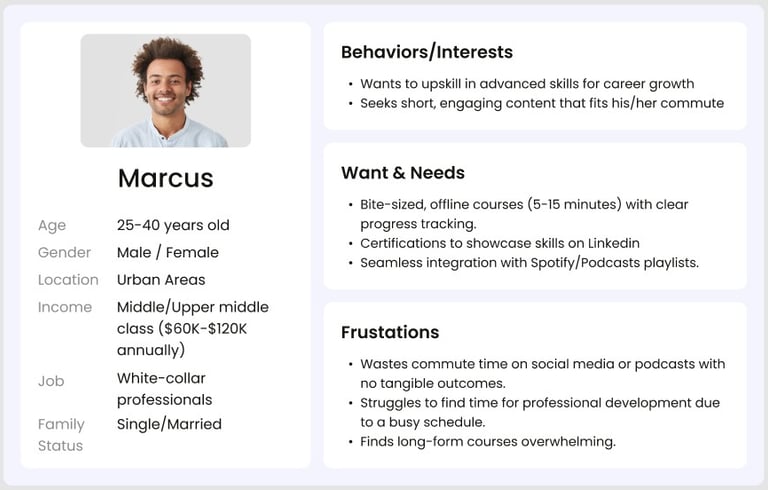

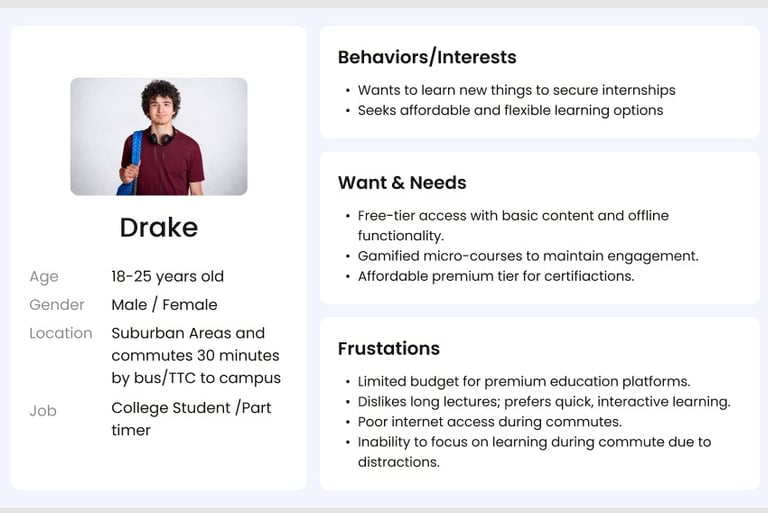

Monetization Strategy
Freemium Model: Free tier offers basic micro-courses with ads; premium tier ($7.99/month) includes curated plans, certifications, and ad-free access.
Enterprise Subscriptions: Offer CommuteEd to businesses at $100/employee/year for workforce upskilling during commutes.
Partner Content: Collaborate with Spotify/Apple Podcasts for sponsored courses, sharing revenue (e.g., 60/40 split).
In-App Purchases: Sell one-time micro-courses or certifications for $9.99–$19.99.
Feature Ideation and Prioritization
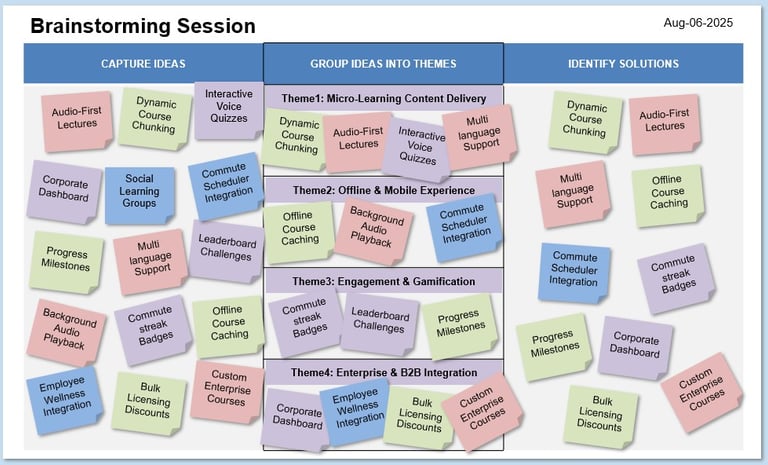

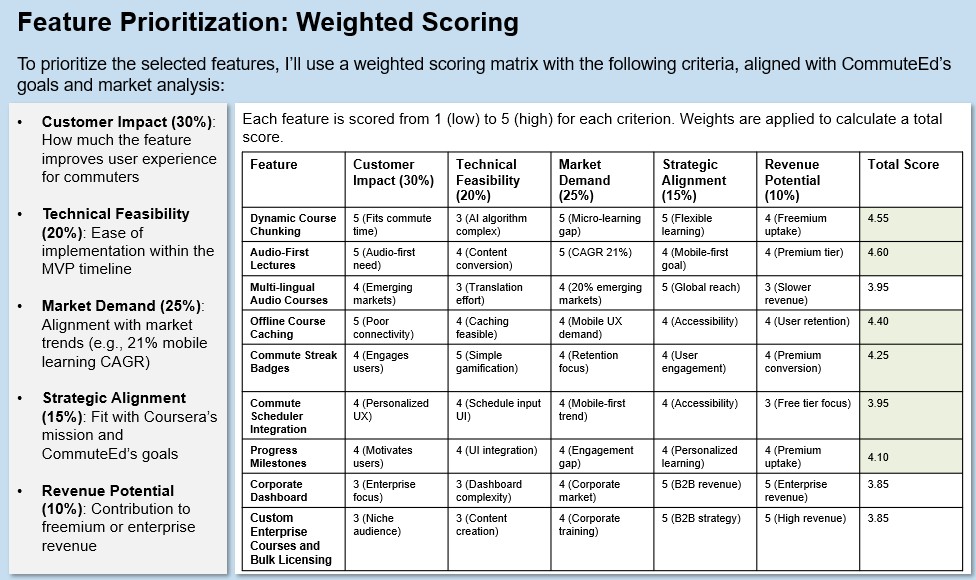

I conducted a brainstorming session to jot down ideas, categorize them into themes, and then select ideas based on market potential.
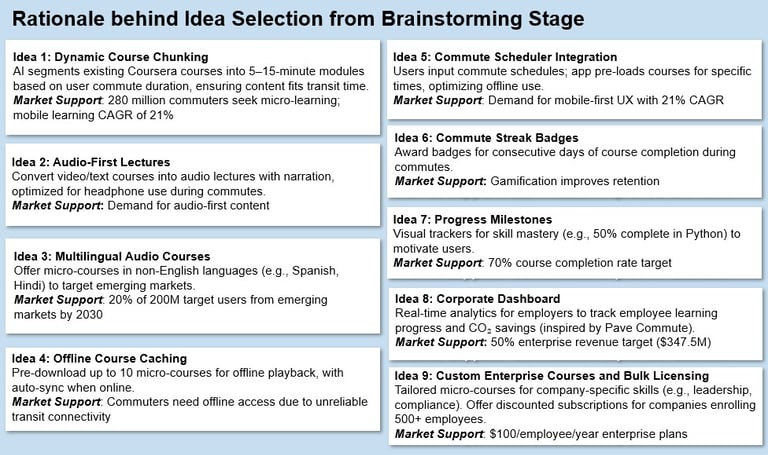

I then used weighted scoring to prioritize features based on customer impact, technical feasibility, market demand, strategic alignment and revenue potential.